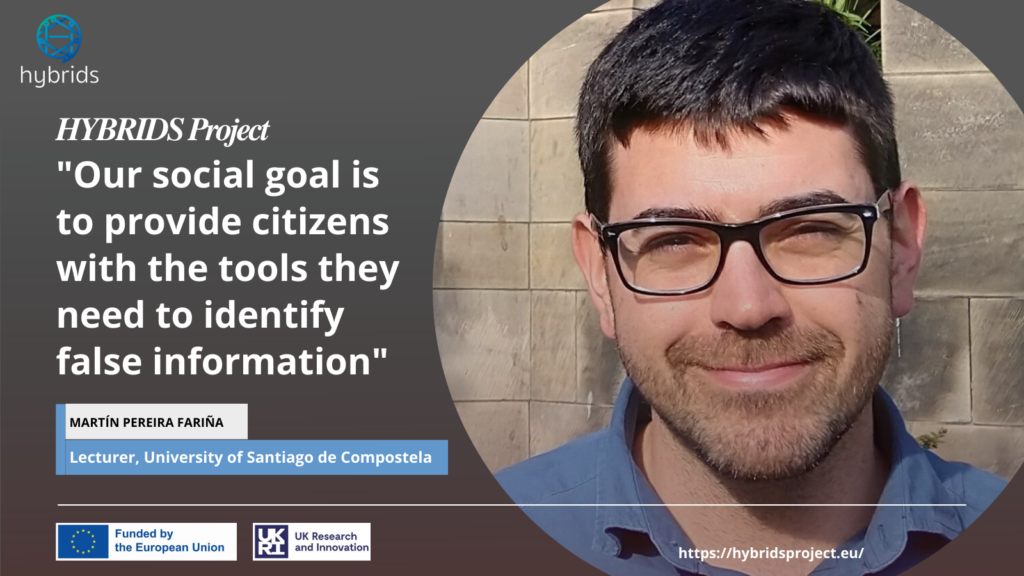By Maria Campins, Newtral
Martin Pereira Fariña is a Lecturer at the Department of Philosophy and Anthropology of the University of Santiago de Compostela (Spain), and member of the HYBRIDS project, the acronym of Hybrid Intelligence to monitor, promote and analyse transformations in good democracy practices. This initiative is working to provide researchers with the knowledge and tools they need to tackle disinformation. Specifically, it will integrate the structured knowledge provided by social and human sciences into natural language processing tools and deep learning algorithms.
Pereira has a Ph.D. in Logic and Computer Science and BA in Philosophy. Through HYBRIDS, he is going to supervise a Ph.D. in analysis and measurement of the impact of political discourse in the citizen’s opinion.
Why is it important to increase knowledge and investigation in hybrid intelligence?
Misinformation and fake news pose significant threats to our societies. They can easily bypass our epistemic vigilance mechanisms, probably easier than even before, and lead us to poor decisions. Technological companies have been using psychological studies to better understand the human condition and make their products more appealing to consumers. Currently, these sophisticated systems are sold to anyone who can afford them, regardless of their goals. For such a long time, their negative effects were often overlooked on individuals and society.
Increasing research on hybrid intelligence will enable us to integrate human cognition into technology development in a positive way. This will lead to the creation of new technologies and products minimising the negative impact in our society. Ultimately, believing in fake news is a matter of trustworthy sources and prevents us from falling prey to misinformation. While it may be impossible to prevent the production of fake news entirely, we can use hybrid intelligence to provide us tools to mitigate those negative effects and protect ourselves.
What kind of research are you going to pursue as part of the project?
The Ph.D. research project that I’m co-supervising focuses on the impact of political debate on citizens’ opinions. With politicians and any political actor delivering messages through different platforms (such as Twitter, Tiktok, Instagram, newspapers, etc.), it is crucial to empirically analyse the discourse produced across these platforms.
We aim to understand the rhetorical and argument strategies used in political discourse and how they shape citizen’s opinion. To achieve this, we need the in-depth analysis of the political discourse across multiple platforms mentioned above. The insights gained from this analysis will provide us important information to develop future strategies for a better public communication.
What do you aim to achieve through the Ph.D. student assigned?
This is an empirically driven research and we aim also to develop theoretically-supported technological tools to assist social and humanistic scientists in their research. Our social goal is to provide citizens with the tools they need to identify false information, thereby reducing the frequency of deception by false information.
What are some of the challenges you face in your research?
The study of language in use is highly complex, especially in its pragmatic dimension. This is not just about what is being said, but also the intended effects on the audience and the credibility of the source of the information. As all of us know, the same message can be interpreted differently by different people based on the speaker or source (among other factors).
The pragmatic dimension of language can only be effectively captured by combining artificial intelligence and human intelligence on a large scale, which is required today. We know that is not easy, but any small step in this direction is better than nothing.
What do you aim to achieve with HYBRIDS?
Establishing networks between researchers and institutions is crucial today. HYBRIDS project provides a unique opportunity for an interdisciplinary network, since social and humanistic researchers and computer scientists will be working together. The whole project has a clear social goal of making society a better place for everyone to live in.

